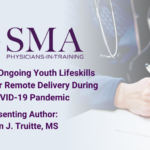Abstract | May 7, 2021
Adapting an Ongoing Youth Lifeskills Curriculum for Remote Delivery During the COVID-19 Pandemic
Learning Objectives
- Identify a process for evaluating and instituting a teen Lifeskills curriculum via remote learning.
Introduction:
In the wake of the Coronavirus Disease 2019 (COVID-19) pandemic there have been unprecedented interruptions to daily life. Young adults have been particularly affected by the cancelation of school and extracurricular activities as well as opportunities for educational and prevention programs, such as those aimed at substance use prevention, increasing health literacy, enhancing communication skills, and relationship building/maintenance. Efficacy of the evidence-based Botvin LifeSkills program in an in-person, classroom setting is well described for high-school-age students. Implementation of these programs over virtual space, as required by the COVID-19 pandemic, is not yet fully established. The Youth Engagement Program (YEP), part of the Division of Community Health and Research at Eastern Virginia Medical School, set out to utilize existing relationships with high school aged students to adapt a summer LifeSkills program for an online forum in compliance with physical distancing requirements.
Methods:
A team of mentors (3 EVMS faculty members, 2 medical students and 3 undergraduate students from a local college) collaborated to adapt the existing ten week summer program from in-person delivery to an online video conference format. The summer program consisted of ten weekly 1.5 hour long virtual sessions which were held on the Zoom video conferencing platform. The Botvin LifeSkills ® Training high school curriculum was used as a framework. Each session was a mix of mentor lead topic exploration and open-ended conversations. Conversations were intentionally kept open-ended to allow teens to explore the presence and impact of each weekly topic on their own experiences. Outside of weekly meetings, mentors were assigned mentees from the students to individually contact to ensure consistent communication was maintained throughout the summer. Students were recruited from the previous 2 YEP cohorts (N=13, 9 females, 4 males).
Results:
The modified, online Botvin LifeSkills training curriculum provided unique experience for both students and peer mentors. Throughout the ten week summer program teen attendance was recorded (average attendance = 9 students per session). As students became more comfortable with the format and norms of the online forum participation and quality of discussion improved. Responsiveness to peer mentor discussions of LifeSkills topics was consistently positive. Discussions focusing on decision making for health, risk-taking, managing stress, and family communication were of particular impact owing to the ongoing COVID-19 pandemic and quarantine. Students shared relevant personal anecdotes related to their experiences in these areas prompting further conversation.
Conclusion:
An online-based LifeSkills curriculum provides a medium for group discussions to take place in accommodation of physical distancing requirements brought on by the COVID-19 pandemic. Planning and implementing the changes to the youth program was necessary to continue to build relationships with youth in the Norfolk community as well as to provide an outlet for these students during a difficult period. Future assessments for evaluation of programmatic impacts on teen self-efficacy and other outcomes are being prepared as the program transitions into the new school year with physical distancing requirements continuing for the foreseeable future.

